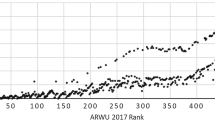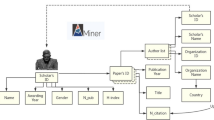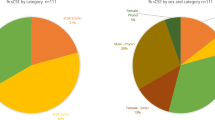Abstract
A high level of citations is generally associated with the exceptional influence of an article. Authors of several highly cited articles are thus considered and scrutinized as influential members within their scientific discipline and beyond when their activity spans several disciplines. Identifying individuals who have made outstanding contributions to science is the motivation behind the Highly Cited Researchers (HCR) list published annually by a commercial company. This article is devoted to the case of highly cited researchers affiliated with French institutions. We study the characteristics of the HCR population: productivity, gender bias, career and persistence on the list, collaboration network, and scientific integrity. Then, from the annual lists of HCRs from 2014 to 2022, we examine what the number of HCRs tells us about France's place in the world scientific arena, its evolution over a decade, and its geographical and institutional distribution. We discuss whether the population of French HCRs constitutes a scientific elite by examining the case of Mathematics. Finally, we discuss several indicators which could be used to verify that a researcher is close to the threshold to enter the list.

© Tableau software



© Tableau Software
Similar content being viewed by others
Data availability
Web of Science raw data used in this study have been made available under license by Clarivate Analytics. The authors are not allowed to redistribute WoS data which therefore cannot be made available. All other data are available from the corresponding author upon reasonable request.
Notes
In the Medical disciplines, for French physicians, we did not use the year of their thesis defense but rather the year of obtaining a doctorate, which may push back the average academic age for this category by a few years. It should be noted that for studies calculating the academic age from the year of first publication, there could be a difference of one or two years with our calculations based on the year of Ph.D., the first publication most often occurring before Graduation.
This is not exactly the official list since the status of Univ Lyon has not been confirmed yet. One caveat though: the indicator of the number of HCRs is affected here both by disciplinary biases (over-representation of the medical and health sector) and by the imprecision of the location of personnel of national research organizations.
The Q-parameter of the Q-model accounts for the individual-level ability to make high-quality scientific contributions and is not affected by time. The higher the Q parameter is, the higher the probability that researchers will publish high-quality scientific papers.
The Q parameter is based on the geometric mean of the citations that a scientific oeuvre of an individual researcher receives (after ten years of publication).
References
Aksnes, D. W., & Aagaard, K. (2021). Lone geniuses or one among many? An explorative study of contemporary highly cited researchers. Journal of Data and Information Science*, 6(2), 41–66. https://doi.org/10.2478/jdis-20210019
Alhuthali, S., & Sayed, A. (2022). Saudi universities rapid escalation in academic ranking systems: implications and challenges. Journal of Controversial Ideas. https://doi.org/10.35995/jci02010008
Basu, A. (2006). Using ISI’s “Highly Cited Researchers” to obtain a country level indicator of citation excellence. Scientometrics, 68(3), 361–375. https://doi.org/10.1007/s11192-006-0117-x
Basu, A., Foland, P., Holdridge, G., & Shelton, R. D. (2018). China’s rising leadership in science and technology: quantitative and qualitative indicators. Scientometrics, 117(1), 249–269. https://doi.org/10.1007/s11192-018-2877-5
Bernela, B., & Bouba-Olga, O. (2014). Concentrer la recherche et attirer des créatifs? Remise en cause d’une politique à partir d’études empiriques. Annales Des Mines—Responsabilité Et Environnement, 74, 71–74. https://doi.org/10.3917/re.074.0071
Borchardt, R., & Hartings, M. R. (2018). The academic papers researchers regard as significant are not those that are highly cited. Blog LSE. Retrieved May 14, 2018, from https://blogs.lse.ac.uk/impactofsocialsciences/2018/05/14/the-academic-papers-researchers-regard-as-significant-are-not-those-that-are-highly-cited/.
Bornmann, L. (2014). How are excellent (highly cited) papers defined in bibliometrics? A quantitative analysis of the literature. Research Evaluation, 23(2), 166–173. https://doi.org/10.1093/reseval/rvu002
Bornmann, L., & Bauer, J. (2015). Evaluation of the highly-cited researchers’ database for a country: Proposals for meaningful analyses on the example of Germany. Scientometrics, 105(3), 1997–2003. https://doi.org/10.1007/s11192-015-1619-1
Bornmann, L., & Daniel, H. (2008). What do citation counts measure? A review of studies on citing behavior. Journal of Documentation, 64(1), 45–80. https://doi.org/10.1108/00220410810844150
Bornmann, L., & Leydesdorff, L. (2018). Count highly-cited papers instead of papers with h citations: Use normalized citation counts and compare “like with like”! Scientometrics, 115, 1119–1123. https://doi.org/10.1007/s11192-018-2682-1
Bornmann, L., Bauer, J., & Haunschild, R. (2015). Distribution of women and men among highly cited scientists. Journal of the Association for Information Science and Technology, 66(12), 2715–2716. https://doi.org/10.1002/asi.23583
Bornmann, L., Bauer, J., & Schlagberger, E. M. (2017). Characteristics of highly cited researchers 2015 in Germany. Scientometrics, 111(1), 543–545. https://doi.org/10.1007/s11192-017-2248-7
Clarivate Analytics. (2022). Highly cited researchers (web site). Retrieved March 1, 2023, from https://clarivate.com/highly-cited-researchers/.
Confraria, H., Blanckenberg, J., & Swart, C. (2018). The characteristics of highly cited researchers in Africa. Research Evaluation, 27(3), 222–237. https://doi.org/10.1093/reseval/rvy017
Docampo, D., & Cram, L. (2014). Highly cited researchers and the Shanghai ranking—technical report. https://doi.org/10.13140/RG.2.2.28524.16008
Docampo, D., & Cram, L. (2019). Highly cited researchers: A moving target. Scientometrics, 118(3), 1011–1025. https://doi.org/10.1007/s11192-018-2993-2
Docampo, D., Egret, D., & Cram, L. (2022). An anatomy of the academic ranking of world universities (Shanghai ranking). SN Social Sciences, 2, 146. https://doi.org/10.1007/s43545-022-00443-3
Grossetti, M., Maisonobe, M., Jégou, L., Milard, B., & Cabanac, G. (2020). Spatial organisation of French research from the scholarly publication standpoint (1999–2017): Long-standing dynamics and policy-induced disorder. EPJ Web of Conferences, 244, 01005. https://doi.org/10.1051/epjconf/202024401005
Hicks, D., Wouters, P., Waltman, L., de Rijcke, S., & Rafols, I. (2015). The Leiden Manifesto for research metrics. Nature, 520, 429–431. https://doi.org/10.1038/520429a
Ioannidis, J. P., Klavans, R., & Boyack, K. W. (2016). Multiple citation indicators and their composite across scientific disciplines. PLoS Biology, 14(7), e1002501. https://doi.org/10.1371/journal.pbio.1002501
Ioannidis, J. P. A., Baas, J., Klavans, R., & Boyack, K. W. (2019). A standardized citation metrics author database annotated for scientific field. PLoS Biology, 17(8), e3000384. https://doi.org/10.1371/journal.pbio.3000384
Kamali, N., Rahimi, F., & Abadi, A. T. B. (2022). Learning from retracted papers authored by the highly cited iran-affiliated researchers: Revisiting research policies and a key message to clarivate analytics. Science and Engineering Ethics, 28, 18. https://doi.org/10.1007/s11948-022-00368-3
Koltun, V., & Hafner, D. (2021). The H-index is no longer an effective correlate of scientific reputation. PLoS ONE, 16(6), e0253397. https://doi.org/10.1371/journal.pone.0253397
Kosmulski, M. (2020). Nobel laureates are not hot. Scientometrics, 123, 487–495. https://doi.org/10.1007/s11192-020-03378-9
Larivière, V., Ni, C., Gingras, Y., Cronin, B., & Sugimoto, C. R. (2013). Global gender disparities in science. Nature, 504(7479), 211–213. https://doi.org/10.1038/504211a
Leydesdorff, L., Wouters, P., & Bornmann, L. (2016). Professional and citizen bibliometrics: Complementarities and ambivalences in the development and use of indicators—a state-of-the-art report. Scientometrics, 109(3), 2129–2150. https://doi.org/10.1007/s11192-016-2150-8
Li, J. T. (2018). On the advancement of highly cited research in China: An analysis of the highly cited database. PLoS ONE, 13(4), e0196341. https://doi.org/10.1371/journal.pone.0196341
Martinez, M., & Sá, C. (2020). Highly cited in the south: International collaboration and research recognition among Brazil’s highly cited researchers. Journal of Studies in International Education, 24(1), 39–58. https://doi.org/10.1177/1028315319888890
Meho, L. I. (2020). Highly prestigious international academic awards and their impact on university rankings. Quantitative Science Studies, 1(2), 824–848. https://doi.org/10.1162/qss_a_00045
Meho, L. I. (2022). Gender gap among Highly Cited Researchers, 2014–2021. Quantitative Science Studies, 3(4), 1003–1023. https://doi.org/10.1162/qss_a_00218
MESRI. (2023). State of scientific employment in France—report 2023. Retrieved from https://www.vie-publique.fr/rapport/288692-l-etat-de-l-emploi-scientifique-en-france-rapport-2023.
Must, Ü. (2020). The highly cited researchers with researcher ID: Patterns of behavior through time. Journal of Scientometric Research, 9(2), 195–199. https://doi.org/10.5530/jscires.9.2.23
Nagane, H. S., Fukudome, Y., & Maki, K. (2018). An analysis of star scientists in Japan. In 2018 IEEE international conference on engineering, technology and innovation (ICE/ITMC), Stuttgart, Germany (pp. 1–5). https://doi.org/10.1109/ICE.2018.8436388.
Nielsen, M. W., & Andersen, J. P. (2021). Global citation inequality is on the rise. Proceedings of the National Academy of Sciences, 118(7), e2012208118. https://doi.org/10.1073/pnas.2012208118
OST. (2021). La position scientifique de la France dans le monde et en Europe, 2002–2018. Observatoire des Sciences et Techniques. Retrieved from https://www.hceres.fr/fr/publications/la-position-scientifique-de-la-france-dans-le-monde-et-en-europe-2005-2018-ost.
Rodríguez-Navarro, A., & Brito, R. (2022). Research assessment based on the number of top researchers. Journal of Scientometric Research, 11(3), 286–294. https://doi.org/10.5530/jscires.11.3.32
Schreiber, M. (2013). A case study of the arbitrariness of the h-index and the highly-cited-publications indicator. Journal of Informetrics, 7(2), 379–387. https://doi.org/10.1016/j.joi.2012.12.006
Shamsi, A. (2021). Gender of Highly Cited Researchers focused on the cross-field category. Gaceta Sanitaria, 35(5), 506–507. https://doi.org/10.1016/j.gaceta.2020.03.007
Sinatra, R., Wang, D., Deville, P., Song, C., & Barabási, A. L. (2016). Quantifying the evolution of individual scientific impact. Science, 354(6312), aaf5239. https://doi.org/10.1126/science.aaf5239
Sinay, L., Carter, R. W., & de Sinay, M. C. F. (2020). In the race for knowledge, is human capital the most essential element? Humanities & Social Sciences Communications, 7, 20. https://doi.org/10.1057/s41599-020-0521-5
Szomszor, M., Pendlebury, D. A., & Adams, J. (2020). How much is too much? The difference between research influence and self-citation excess. Scientometrics, 123, 1119–1147. https://doi.org/10.1007/s11192-020-03417-5
Teixeira da Silva, J. A., & Dobránszki, J. (2018). Multiple versions of the *h*-index: Cautionary use for formal academic purposes. Scientometrics, 115, 1107–1113. https://doi.org/10.1007/s11192-018-2680-3
Tijssen, R. J. W., Visser, M. S., & van Leeuwen, T. N. (2002). Benchmarking international scientific excellence: Are highly cited research papers an appropriate frame of reference? Scientometrics, 54, 381–397. https://doi.org/10.1023/A:1016082432660
Van Leeuwen, T. N., Visser, M. S., Moed, H. F., Nederhof, T. J., & Van Raan, A. F. J. (2003). The Holy Grail of science policy: Exploring and combining bibliometric tools in search of scientific excellence. Scientometrics, 57, 257–280. https://doi.org/10.1023/A:1024141819302
Van Noorden, R. (2020). Highly cited researcher banned from journal board for citation abuse. Nature, 578, 200–201. https://doi.org/10.1038/d41586-020-00335-7
Van Noorden, R., & Chawla, D. S. (2019). Hundreds of extreme self-citing scientists revealed in new database. Nature, 572, 578–579. https://doi.org/10.1038/d41586-019-02479-7
Waltman, L. (2016). A review of the literature on citation impact indicators. Journal of Informetrics, 10(2), 365–391. https://doi.org/10.1016/j.joi.2016.02.007
Warner, J. (2000). A critical review of the application of citation studies to the Research Assessment Exercises. Journal of Information Science, 26(6), 453–460. https://doi.org/10.1177/016555150002600607
Wei, Y., & He, S. (2021). The characteristics of highly cited researchers in China. In iConference 2021. Retrieved from http://hdl.handle.net/2142/109688.
Zhang, N., Wan, S., Wang, P., Zhang, P., & Wu, Q. (2018). A bibliometric analysis of highly cited papers in the field of economics and business based on the essential science indicators database. Scientometrics, 116, 1039–1053. https://doi.org/10.1007/s11192-018-2786-7
Zuckerman, H. (1977). Scientific elite. Nobel laureates in the United States. Transaction Publishers. Retrieved from https://wellcomecollection.org/works/wexh9yfx.
Funding
The work of Domingo Docampo has received financial support from the Xunta de Galicia (Centro singular de investigación de Galicia accreditation 2019–2022) and the European Union (European Regional Development Fund—ERDF).
Author information
Authors and Affiliations
Contributions
LC: conceptualization and data curation, LC, DE, DD: formal analysis and investigation, LC: writing—original draft, DE, DD: writing—review and editing, DE, DD: supervision.
Corresponding author
Ethics declarations
Conflict of interest
The authors declare no conflict of interest.
Rights and permissions
Springer Nature or its licensor (e.g. a society or other partner) holds exclusive rights to this article under a publishing agreement with the author(s) or other rightsholder(s); author self-archiving of the accepted manuscript version of this article is solely governed by the terms of such publishing agreement and applicable law.
About this article
Cite this article
Chaignon, L., Docampo, D. & Egret, D. In search of a scientific elite: highly cited researchers (HCR) in France. Scientometrics 128, 5801–5827 (2023). https://doi.org/10.1007/s11192-023-04805-3
Received:
Accepted:
Published:
Issue Date:
DOI: https://doi.org/10.1007/s11192-023-04805-3




